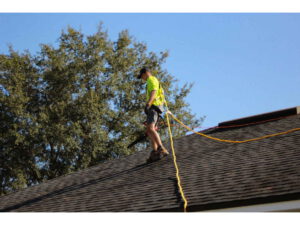When hiring a Roofing Contractor it’s important to know the basics. Roofing contractors should have their own liability insurance, and homeowners should have this insurance as well. This insurance covers any accidents that occur while a roofing contractor is working on your home. Sadly, many roofing contractors do not use fall arrest protection during the job. A fall arrest system is a secure point on the roof that prevents an individual from falling and suffering serious injuries.

You should get references from any potential contractors you interview. You should also ask for proof of their insurance coverage, including personal liability, worker’s compensation, and property damage. Roofing contractors should also have a meeting with your insurance adjuster to review the project quote and determine whether it covers the costs of repairs. The adjuster should approve the roofing contractor’s work and should give you the insurance policy details and the name of the insurance company. Ask about the warranty period and ask about any damage to your property.
Before hiring a roofing contractor, you should check the building authority. Most roofing jobs require building permits, though they’re not always necessary for smaller repairs of a hundred square feet or less. Once you’ve found a contractor who you’re comfortable with, you can sign the contract and let them begin working. The contractor should be able to start work on your home within two to six weeks, depending on the time of year and the weather.
To get a bond, a roofing contractor must provide a lot of information to the bonding company. They must submit a business plan, description of the proposed work, multiple financial statements, and proof of credit with an accredited bank. A bonding company can’t work with a new roofing company if they don’t have sufficient financial resources to cover the project. Therefore, it’s important to look for a bonded contractor before signing a contract.
Roofing contractors should have a state license. There are two license types for roofing contractors in the state. One is the Residential license, which is restricted to single-family dwellings, while the other is for commercial and multi-family properties. In addition to a roofing contractor’s license, he or she must show proof of insurance and a $10,000 surety bond. If you’re looking for a state license, be sure to check out all of the requirements and regulations.
You may not need to have a roofing contractor’s license, but you should make sure they’re registered with the local licensing board. It doesn’t require a license for roofing contractors. All other contractors need a license from the Department of Labor. However, it’s important to check whether your state requires a roofing license before hiring a contractor. It’s also a good idea to check if your state has any special requirements for licensed contractors in your state.
If you are interested in a career in roofing, you should consider getting some training. There are numerous courses and entry-level jobs that can teach you the basic skills needed to become a roofing contractor. In addition, you’ll also learn about safety requirements and the materials and equipment needed for your project. While there are no formal educational requirements for roofing contractors, having some experience in construction-related fields will give you an edge in the job market.
Depending on your state, you’ll have to register with the Department of Labor and Industries. If you’re interested in working, however, you must get a roofing contractor’s license from the State Contractors Board (DOR). Roofing contractors in the state must have a C-15a license from the Department of Professional and Occupational Regulation Board. You’ll also need to prove that you have workers’ compensation insurance.
When choosing a Roofing Contractor, you should ask them how they install their shingles. There are certain types that require four nails while others need six nails. Make sure you confirm this information in your contract. Some contractors will install shingles with six nails. If you’re paying extra for a limited warranty, you may have to pay more to get your roof installed using the six-nail method. Likewise, you should ask your roofing contractor to use the installation method that’s best for your home’s unique requirements.